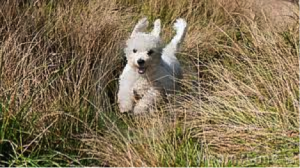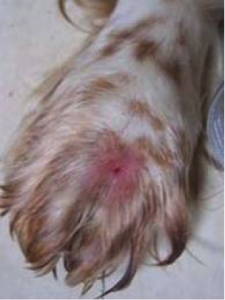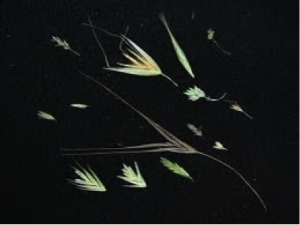GRASS SEEDS AND YOUR PET
Grass seeds can be a real frustration for you and a real pain for your dog, especially in late spring and summer. They commonly lodge themselves into dogs’ paws, ears and eyes. It is important to recognise the signs of a possible grass seed problem early, as this can allow a faster resolution. There are also a number of important measures to put in place to decrease the occurrence of this problem.
GRASS SEEDS CAUSE PROBLEMS FOR YOUR DOG
The shape of grass seeds with their sharp tip means that they can very easily penetrate through your dog’s skin or lodge themselves in your pet’s ears or eyes. Most seeds have an awn that fans out and makes it almost impossible for the grass seed to go backwards – similar to the action of the tip of a fish hook.
Grass seeds can lodge themselves into any part of your dog’s body. Grass seeds will generally start their journey when they get caught in your dog’s coat during a walk or play in long grass. From there, they are able to penetrate the skin and if undetected, can travel to various areas of the body. Grass seeds carry infection through the skin and into the body and will generally cause a painful swelling which progresses to cause an abscess in your dog.
SYMPTOMS
Signs of grass seed related problems depend on where the grass seed is lodged. This will often cause a swelling at the site of lodgement, which you dog will often become very irritated with. Often dogs will try to lick, scratch or chew the affected area.

Symptoms to look out for include:
| AFFECTED AREA Toes and feet
|
Symptom
• swelling on the foot, often with a ‘weeping’ hole • excessive licking or chewing |
| Ears | • shaking head or scratching ear • painful to touch ear, yelping |
| Eyes | • squinting or rubbing eye • swollen eye with or without discharge |
DIAGNOSIS
Diagnosis can often be done based on the history and clinical examination of your animal, and it is confirmed with the findings of a grass seed in an affected area.
TREATMENT
Treatment depends on the location of the grass seed and how deeply the seed has lodged itself.
If a patient is cooperative the grass seed can sometimes be removed during a consultation, so long as it hasn’t travelled too deeply into the body and the patient is cooperative and the seed is accessible. Many dogs however, will require sedation or a general anaesthetic to allow probing for the seed, especially if the area is painful.
If the area affected is located in the skin, the affected area can be probed with a special tweezer-like instrument. Grass seeds in the ear can be retrieved with special long tweezers, usually under sedation and grass seeds in the eye will often require removal with a cotton tip or tweezers – your dog’s eye will need further examinations and medications if the grass seed has caused damage to the eye.
If a grass seed is highly suspected, but no seed is found with probing, surgical exploration may be required to locate the seed. Antibiotics and anti-inflammatory medication are usually required after removing a grass seed as they often carry infection into the body where they have lodged and cause inflammation in the surrounding area. Occasionally grass seeds can travel through intestines and even lodge next to the spine. For seeds that have travelled a long distance, CT scan or specialist ultrasound may be suggested.
POTENTIAL COMPLICATIONS
| Affected Area
Toes and feet |
The grass seed has the potential to travel up your dog’s leg between tendons and ligaments, even up to the shoulder or the groin! |
|
| Ears | Grass seeds lodged inside the ear canal cause severe irritation and can cause infection, and can rupture the ear drum, causing serious problems with the deeper structures of the ear including middle and inner ear infections which can cause dizziness. | |
| Eyes | Occasionally grass seeds can lodge in the third eyelid (pink flap that comes from the inner corner of the eye) and sometimes can penetrate through the eye.
|
|
| Inhalation or ingestion
Vulva or prepuce |
Grass seeds can be inhaled or swallowed. Grass seeds can get into airways and cause damage, severe pain and irritation in the nose and may even cause pneumonia, or a collapsed lung. They can be very difficult to detect and a life threatening condition can quickly ensue. Ingested grass seeds are usually digested by the body, but in rare cases can penetrate through the digestive system into nearby tissues or organs.
Licking or even biting at the vulva or end of the prepuce can indicate a grass seed and this can cause urinary tract infections from the self trauma. |
EXPECTATION
The expected outcome if the grass seed is removed is generally good. Sometimes anti-inflammatories and antibiotics are required to combat infection and inflammation caused by the grass seed and these problems usually resolve within a week without further problems. Often an Elizabethan collar must be worn to prevent self trauma (especially by licking) to allow the wound to heal. It is important to follow the guidelines set by your vet to prevent excess scar tissue or delayed healing.
If the grass seed is not removed, infection can remain and seeds can travel to other areas or cause more severe complications.

PREVENTION
It is important to be on the lookout during the late spring and summer months when there is a greater risk of grass seed problems. Important tips to prevent grass seed problems are:
• Keep your grass and weeds under control at home with regular maintenance
• Avoid long grass when on walks
• Keep long haired dogs groomed, especially around their feet and ears.
• Inspect your dog all over after each walk, making sure you check in between and under all toes and underneath the ears
- If your dog is licking or chewing at a particular foot or feet or shows any sign of lameness, check for grass seeds between the toes. If your dog starts sneezing frequently or shaking their head there may be a grass seed up the nose or in the ear.
• See a vet immediately if you suspect a grass seed problem, the earlier the problem is detected, the better chance you will have of finding the grass seed before it causes further problems or becomes very difficult to locate!

